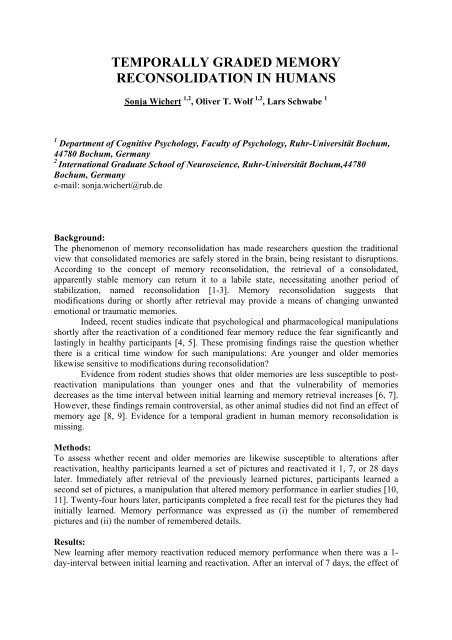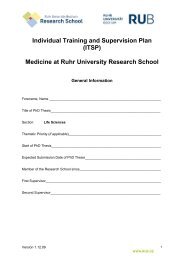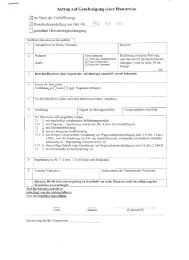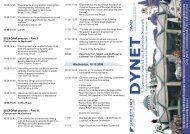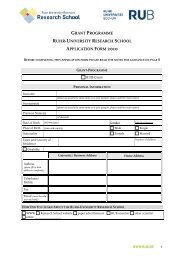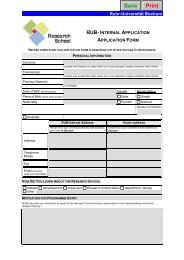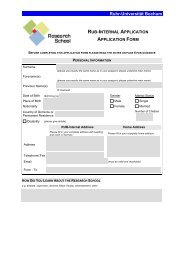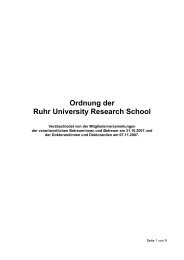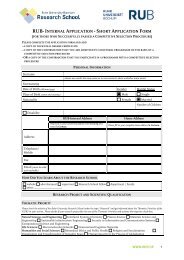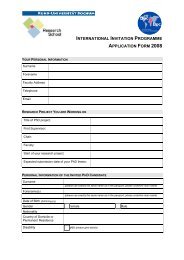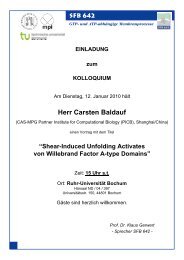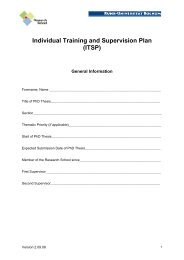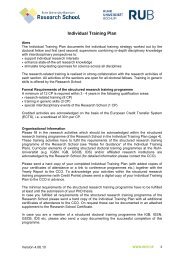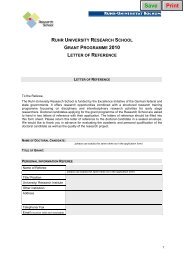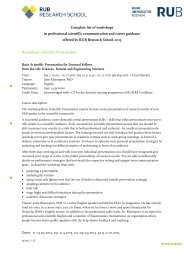Section Days abstract book 2010.indd - RUB Research School ...
Section Days abstract book 2010.indd - RUB Research School ...
Section Days abstract book 2010.indd - RUB Research School ...
You also want an ePaper? Increase the reach of your titles
YUMPU automatically turns print PDFs into web optimized ePapers that Google loves.
TEMPORALLY GRADED MEMORY<br />
RECONSOLIDATION IN HUMANS<br />
Sonja Wichert 1,2 , Oliver T. Wolf 1,2 , Lars Schwabe 1<br />
1<br />
Department of Cognitive Psychology, Faculty of Psychology, Ruhr-Universität Bochum,<br />
44780 Bochum, Germany<br />
2<br />
International Graduate <strong>School</strong> of Neuroscience, Ruhr-Universität Bochum,44780<br />
Bochum, Germany<br />
e-mail: sonja.wichert@rub.de<br />
Background:<br />
The phenomenon of memory reconsolidation has made researchers question the traditional<br />
view that consolidated memories are safely stored in the brain, being resistant to disruptions.<br />
According to the concept of memory reconsolidation, the retrieval of a consolidated,<br />
apparently stable memory can return it to a labile state, necessitating another period of<br />
stabilization, named reconsolidation [1-3]. Memory reconsolidation suggests that<br />
modifications during or shortly after retrieval may provide a means of changing unwanted<br />
emotional or traumatic memories.<br />
Indeed, recent studies indicate that psychological and pharmacological manipulations<br />
shortly after the reactivation of a conditioned fear memory reduce the fear significantly and<br />
lastingly in healthy participants [4, 5]. These promising findings raise the question whether<br />
there is a critical time window for such manipulations: Are younger and older memories<br />
likewise sensitive to modifications during reconsolidation?<br />
Evidence from rodent studies shows that older memories are less susceptible to postreactivation<br />
manipulations than younger ones and that the vulnerability of memories<br />
decreases as the time interval between initial learning and memory retrieval increases [6, 7].<br />
However, these findings remain controversial, as other animal studies did not find an effect of<br />
memory age [8, 9]. Evidence for a temporal gradient in human memory reconsolidation is<br />
missing.<br />
Methods:<br />
To assess whether recent and older memories are likewise susceptible to alterations after<br />
reactivation, healthy participants learned a set of pictures and reactivated it 1, 7, or 28 days<br />
later. Immediately after retrieval of the previously learned pictures, participants learned a<br />
second set of pictures, a manipulation that altered memory performance in earlier studies [10,<br />
11]. Twenty-four hours later, participants completed a free recall test for the pictures they had<br />
initially learned. Memory performance was expressed as (i) the number of remembered<br />
pictures and (ii) the number of remembered details.<br />
Results:<br />
New learning after memory reactivation reduced memory performance when there was a 1day-interval<br />
between initial learning and reactivation. After an interval of 7 days, the effect of


